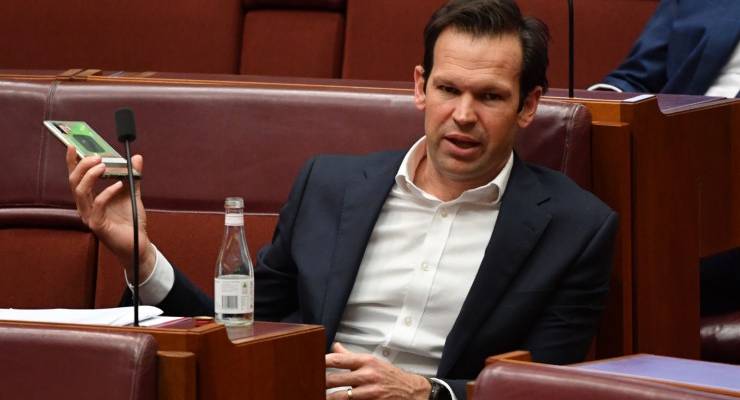
The Coalition sometimes likes to consider itself a broad church. So far this election campaign the church’s foundations are being stretched to breaking point.
The latest challenge to the uneasy alliance between urban moderates who drive Teslas and a more reactionary rump enamoured of coal and culture war came — as it often does — in the form of Matt Canavan.
Yesterday the Nationals senator unilaterally declared net zero emissions by 2050 “all over barring the shouting”, just hours after Prime Minister Scott Morrison declared it was the government’s “absolute policy”.
For Morrison, who gave away so much to get the Nats on board with a pretty vague net zero plan just six months ago, Canavan’s intervention was pretty unwelcome, and puts to bed the government’s spin about ending the climate wars.
But the intervention was utterly predictable. Freed from the shackles of ministerial ambition, Canavan can sit on the backbench and post about his love for coal. Last year he remained opposed to net zero until the bitter end, even as the Nats partyroom agreed to a deal.
Even so, several of Canavan’s Liberal and Nationals colleagues tried to downplay or dismiss his comments; former deputy prime minister Michael McCormack agreed it was time for the senator to pull his head in.
The government would want Canavan to put a sock in it because the response from “teal” independents mounting a credible threat to moderate Liberal MPs in affluent urban electorates like Wentworth, North Sydney and Goldstein was predictable.
They’ve long argued the Morrison government isn’t serious about emissions reduction, its hands permanently tied by climate deniers in the National Party. Canavan makes their case even stronger.
But the senator’s comments, toxic in Woollahra, might play a bit better in central Queensland seats like Flynn, where the LNP candidate Colin Boyce (correctly) identified the government’s net zero plan as a “flexible” one which left wriggle room. Boyce is on record opposing net zero right after the Nationals agreed to it last year.
The problem for the government is obvious. Morrison owes his 2019 miracle to seats like Flynn, where a shock anti-Labor swing, driven by fears about a Shorten government’s plans for the coal industry devastated the opposition.
But the electoral map has changed. The challenge from the independents is more potent and widespread. Even if none win, it forces the Liberals to drain resources towards defending seats they’ve never lost, and somehow come up with a message that satisfies miners, coal executives, and Tesla-driving tree tories.
It’s this struggle of keeping together the broad church that explains some of how this campaign has operated, with different Liberals and Nationals playing to their different bases. Treasurer Josh Frydenberg, seen as more palatable in the cities despite a serious challenge to his own seat, has been trying to campaign against the teals.
Morrison, seen as a master on the hustings, is trying to pitch himself as the everyman who can unite the factions and sell both visions of a Coalition future. In Rockhampton today he was accusing Labor of trying to introduce a “sneaky” carbon tax.
Canavan and Joyce keep reminding coal country the Coalition has its back. That Joyce didn’t join the PM today despite being in Rockhampton and still hasn’t campaigned with him shows just how toxic he is in much of the country, even if he and Canavan’s anti-net zero message is useful in Flynn.
But that high-wire act of trying to sing a different tune to different parts of the country could all become a little too hard for the Morrison government. A similar problem emerged over Morrison’s support for embattled transphobic Warringah candidate Katherine Deves, seen by some as a 5D chess move to win social conservatives in the suburbs while sacrificing the leafy seats, which the polls show could be failing.
More generally, the last parliamentary term came to a tense, cantankerous end, characterised by legislative stagnation and rebellion from moderates and conservatives alike. The broad church is feeling the strain, and it’s going to get a lot more than campaign spin to keep it all together.








This isn’t a Coalition – it’s not even a broad church – it’s the ‘Hydra of Leaners’.
Even with the nine heads there is less cerebral activity than in a ceramic egg placed under a broody chook.
Basically we have 2 Tory parties in this country. Labor and the LNP. The LNP were kept closer to the middle ground by the wets. The ultra right of the party led by Howard waged an internecine war on the wets. It is amazing that the LNP having abandoned and derided the centre have ever been elected again. I attribute it to the public failing to recognise the massive shift to the right that has taken place since 1996. Now we have not just ultra right but ultra incompetent and ultra corrupt goons running the country. That is why this election is the most important this century.
Not as broad a church as it once was after all the captain’s picks. More a narrow sect these days.
Or perhaps a cult?
How I love the the comment: “A similar problem emerged over Morrison’s support for embattled transphobic Warringah candidate Katherine Deves, seen by some as a 5D chess move to win social conservatives in the suburbs while sacrificing the leafy seats”
Stop the phony mega phone diplomacy, stop hiding in the Canberra bubble, stop the TV stunts, Stop the phoney war with China. We have switched off. You are not listening to the voting taxpayers.
Matt Canavan.
With the departure of resident oxygen thief George “give me my 100 thou” Christensen, Matt seems determined to take up the role of nihilistic wrecker in chief.
The teal independents must love him: stick a microphone under his trap at every opportunity.
Nothing short of remarkable ie: Canavan revealing the true policy of the Coalition. Morrison declaring anything to be ‘absolute’ immediately raises a red flag.